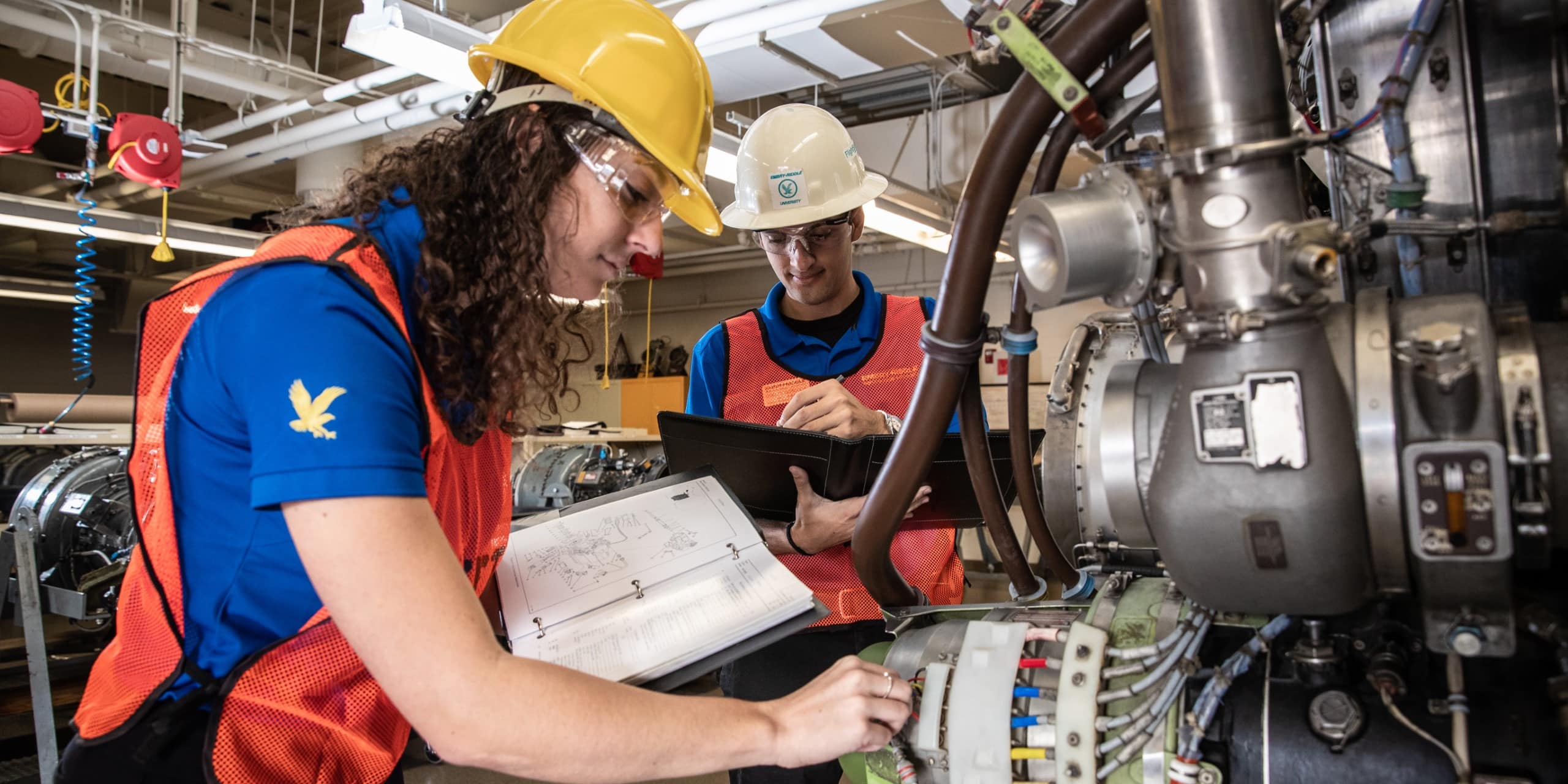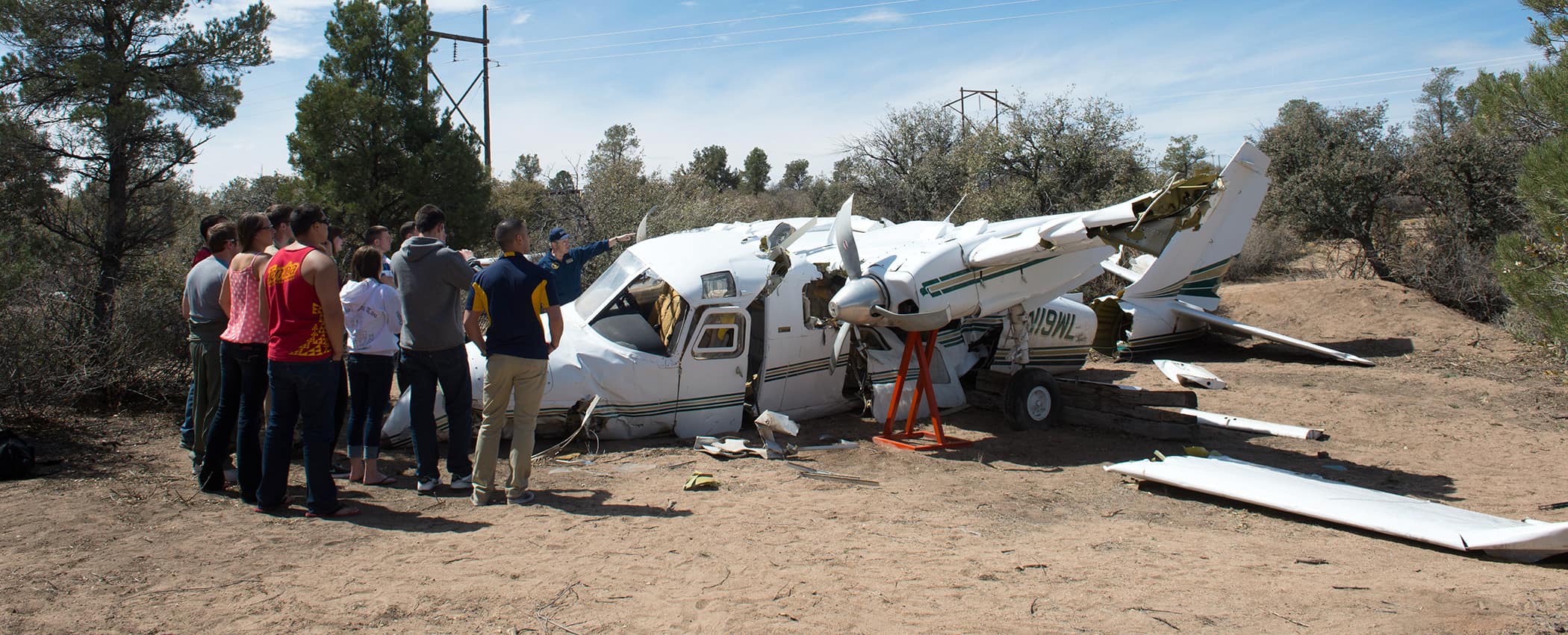
Bachelor of Science in
Safety Management
The Bachelor of Science in Safety Management equips students with practical and analytical problem-solving skills to design safer workplaces.
About the Bachelor of Science in Safety Management
The Bachelor of Science in Safety Management from Embry-Riddle equips students to excel as leaders, managers and practitioners in creating safer workplaces, ensuring employee wellness, conducting safety audits and managing industry hazards.
With approximately 317 million on-the-job accidents reported annually by the International Labor Organization and 5,486 fatal work injuries reported in the U.S. by the Occupational Safety and Health Administration (OSHA) in 2022, our program empowers students with the technical knowledge and analytical problem-solving skills needed to address various safety challenges in the industry.
Why You Should Study this Degree
Safety management involves the proactive identification, assessment and mitigation of workplace hazards to safeguard the well-being of employees. It encompasses:
- Development and strict enforcement of policies, procedures and initiatives preventing workplace accidents, injuries and illnesses.
- Comprehensive training on safe work practices, routine inspections and compliance with safety regulations.
Program and Student Learning Educational Objectives and Outcomes
As you study to become a safety professional, you will have the opportunity to:
- Anticipate, recognize, evaluate, prevent and control hazards to better ensure safe workplaces and implement best practices.
- Apply a broad educational background to influence and achieve the OSH goals and objectives of their employers.
- Effectively communicate and collaborate within a diverse work environment.
- Engage in professional development to demonstrate competency, ensure relevancy in knowledge and skills and maintain currency among changing industry trends.
- Work in an ethical and professional manner.
Safety Management Career Opportunities
Careers and Employers
Embry-Riddle graduates are set to enter the workforce with a placement rate of 100% within a year of graduation, in organizations such as:
- Construction firms
- Educational institutions
- Insurance
- Manufacturing
- Mining
- Oil/natural gas
- Transportation
- U.S. government
Graduate safety practitioners often secure roles as:
- Accident Investigation Inspectors
- Construction Managers
- Environmental Management Directors
- Facilities Managers
- Federal and State OSHA Compliance Officers
- Health and Safety Engineers
- Occupational Health and Safety Specialist/Managers
- Transportation Managers
Safety Management Salary Information
Pursuing an online safety degree from Embry-Riddle Aeronautical University provides students with competitive salaries, falling within a range of $100,000 to 130,000 annually, as of 2024, with the average being $115,590.
DETAILS
About Safety Management at the Worldwide & Online Campus
The Bachelor of Science in Safety Management is designed to prepare graduates to address safety challenges in dynamic regulatory environments. This program is ideal for active-duty military personnel, industry researchers, managers, safety specialists and individuals with no safety and health background.
Our goal is to develop the next generation of safety managers who can create safer workplaces and effectively respond to hazardous situations.
Tracks/Specialties and/or Certificates
The Safety Management program is a Board of Certified Safety Professionals (BCSP) Qualified Academic Program (QAP), meeting rigorous standards and offering a curriculum aligned with the Associate Safety Professional (ASP) designation. Graduates are awarded the GSP designation, putting them on the path toward Certified Safety Professional (CSP) certification. They can also apply for the Associate Safety and Health Manager (ASHM) credential through the Institute of Hazardous Materials Management (IHMM), streamlining the path to the accredited Certified Safety and Health Manager (CSHM) certification.
Safety Management Information
- Credits: 121
- Online or In-Person: Fully online, EagleVision Virtual Classroom or see if a Worldwide location is close to you
Helpful Links
- Attend a Worldwide Virtual Info Session
- Discover the Department's Faculty
- Explore the Fields of Study: Security, Intelligence and Safety
- Find Related Clubs & Organizations
Student Learning Outcomes
Students will:
- Apply mathematics and science and/or technical topics to areas relevant to the discipline to identify, formulate, and solve broadly-defined technical or scientific problems.
- Design a system, process, procedure, or program to meet desired needs.
- Conduct experiments that include the analysis and interpretation of data to use scientific judgment to draw conclusions and test hypotheses.
- Communicate effectively with a range of audiences.
- Explain ethical and professional responsibilities and the impact of technical and/or scientific solutions in global, economic, environmental, and societal contexts.
- Function effectively on teams that establish goals, plan tasks, meet deadlines, and analyze risk and uncertainty.
DEGREE REQUIREMENTS
General Education
| General Education | ||
| Embry-Riddle courses in the general education categories of Communication Theory and Skills, Humanities, Social Sciences, Physical and Life Science, Mathematics, and Computer Science may be chosen from as listed, assuming prerequisites are met. Courses from other institutions are acceptable if they fall into these broad categories and are at the level specified. | ||
| Communication Theory and Skills | ||
| ENGL 123 | English Composition | 3 |
| ENGL (above ENGL 106) / SPCH / COMD (6) | 6 | |
| Humanities | ||
| Any Upper Level Humanities | 3 | |
| Any Lower Level Humanities | 3 | |
| Social Sciences | ||
| Any Social Science | 6 | |
| Physical and Life Science | ||
| Any Physical/Life Science | 3 | |
| Mathematics | ||
| Any College Algebra or Higher Math Series | 6 | |
| Computer Science | ||
| Any Computer Science | 3 | |
| Total Credits | 33 | |
Core/Major
| Safety Management Core | ||
| SFTY 201 | Introduction to Occupational Safety and Health | 3 |
| SFTY 205 | Principles of Accident Investigation | 3 |
| SFTY 311 | Fundamentals of Occupational Safety and Health | 3 |
| SFTY 315 | Environmental Compliance and Safety | 3 |
| SFTY 321 | Ergonomics | 3 |
| SFTY 326 | System Safety | 3 |
| SFTY 355 | Industrial Hygiene and Toxicology | 3 |
| SFTY 441 | Construction Safety and Health | 3 |
| SFTY 365 | Fire Protection | 3 |
| SFTY 426 | System Safety Management | 3 |
| SFTY 450 | Loss Control & Insurance | 3 |
| EMGY 310 | Fundamentals of Emergency Management | 3 |
| EMGY 405 | Disaster Policy and Management | 3 |
| STAT 222 | Business Statistics | 3 |
| CHEM 110 | General Chemistry I | 3 |
| CHEM 110L | General Chemistry I Laboratory | 1 |
| RSCH 202 | Introduction to Research Methods | 3 |
| SFTY 491 | Capstone: Operational Applications in Safety Management | 3 |
| Total Credits | 52 | |
Safety Management Electives
| Safety Management Elective | 18 | |
| Select six Safety Management Courses (SFTY, EMGY, and safety-related SCTY, ESVS, HLSD courses) | ||
Open Electives or Choose Minor: https://nextcatalog.erau.edu/worldwide/minors/
| Open Electives or Minor | 18 | |
| Choose 18 credit hours of Open Electives and/or Minor | ||
| Total Degree Requirements | 121 | |
Plan of Study (BSSM)
Recommended plan of study and sequence of courses for a four-year degree completion scenario. A four-year degree plan or a particular starting term are not required but serve as an example.
Recommended Plan of Study for a Four-Year Degree Completion Scenario
Year 1
| Term 1 | Credits | |
|---|---|---|
| Any Communication Theory and Skills above ENGL 106 | 3 | |
| Any College Algebra or Higher Math Series | 3 | |
| Credits Subtotal | 6.0 | |
| Term 2 | ||
| Any Communication Theory and Skills above ENGL 106 | 3 | |
| Any College Algebra or Higher Math Series | 3 | |
| Credits Subtotal | 6.0 | |
| Term 3 | ||
| STAT 222 | Business Statistics | 3 |
| RSCH 202 | Introduction to Research Methods | 3 |
| Credits Subtotal | 6.0 | |
| Term 4 | ||
| Any Social Science | 3 | |
| Any Computer Science | 3 | |
| Credits Subtotal | 6.0 | |
| Term 5 | ||
| Any Social Science | 3 | |
| Any Physical and Life Science/Physics | 3 | |
| Credits Subtotal | 6.0 | |
| Credits Total: | 30.0 | |
Year 2
| Term 1 | Credits | |
|---|---|---|
| Any Lower-Level Humanities | 3 | |
| Any Communication Theory and Skills above ENGL 106 | 3 | |
| Credits Subtotal | 6.0 | |
| Term 2 | ||
| Any Upper-Level Humanities | 3 | |
| CHEM 110 | General Chemistry I | 3 |
| CHEM 110L | General Chemistry I Laboratory | 1 |
| Credits Subtotal | 7.0 | |
| Term 3 | ||
| SFTY 201 | Introduction to Occupational Safety and Health | 3 |
| SFTY 205 | Principles of Accident Investigation | 3 |
| Credits Subtotal | 6.0 | |
| Term 4 | ||
| EMGY 310 | Fundamentals of Emergency Management | 3 |
| SFTY 311 | Fundamentals of Occupational Safety and Health | 3 |
| Credits Subtotal | 6.0 | |
| Term 5 | ||
| SFTY 315 | Environmental Compliance and Safety | 3 |
| SFTY 321 | Ergonomics | 3 |
| Credits Subtotal | 6.0 | |
| Credits Total: | 31.0 | |
Year 3
| Term 1 | Credits | |
|---|---|---|
| SFTY 326 | System Safety | 3 |
| SFTY 355 | Industrial Hygiene and Toxicology | 3 |
| Credits Subtotal | 6.0 | |
| Term 2 | ||
| SFTY 365 | Fire Protection | 3 |
| EMGY 405 | Disaster Policy and Management | 3 |
| Credits Subtotal | 6.0 | |
| Term 3 | ||
| SFTY 441 | Construction Safety and Health | 3 |
| Safety Management Elective | 3 | |
| Credits Subtotal | 6.0 | |
| Term 4 | ||
| Safety Management Elective | 3 | |
| Safety Management Elective | 3 | |
| Credits Subtotal | 6.0 | |
| Term 5 | ||
| Open Elective | 3 | |
| Open Elective | 3 | |
| Credits Subtotal | 6.0 | |
| Credits Total: | 30.0 | |
Year 4
| Term 1 | Credits | |
|---|---|---|
| SFTY 426 | System Safety Management | 3 |
| SFTY 450 | Loss Control & Insurance | 3 |
| Credits Subtotal | 6.0 | |
| Term 2 | ||
| Safety Management Elective | 3 | |
| Safety Management Elective | 3 | |
| Credits Subtotal | 6.0 | |
| Term 3 | ||
| Safety Management Elective | 3 | |
| Open Elective | 3 | |
| Credits Subtotal | 6.0 | |
| Term 4 | ||
| Open Elective | 3 | |
| Open Elective | 3 | |
| Credits Subtotal | 6.0 | |
| Term 5 | ||
| Open Elective | 3 | |
| SFTY 491 | Capstone: Operational Applications in Safety Management | 3 |
| Credits Subtotal | 6.0 | |
| Credits Total: | 30.0 | |
| Total Degree Requirements | 121 | |
B.S. in Safety Management to M.S. in Occupational Safety Management
This program is for exceptional students committed to continuing their education through a master's degree. This fast-paced program allows qualifying students to complete both the Bachelor of Science in Safety Management (BSSM) and the Master of Science in Occupational Safety Management (MSOSM).
Students must have completed 75 credit hours of undergraduate study and have at least a 3.00 GPA before applying to the program. Senior students accepted in the BSSM/MSOSM program will be allowed to apply up to nine (9) specified graduate credits toward their baccalaureate degree in lieu of up to nine (9) specific undergraduate credits. Upon completing the BSSM requirements, students will be enrolled in the MSOSM degree for completion on an accelerated timeline. Undergraduate students must earn a grade of B or better for any graduate courses taken. Students receiving a C or F grade in any MSOSM graduate courses taken for BSSM credit will be removed from the program, have credit awarded to the BSSM degree only, and continue to complete the BSSM degree. Students initiate program acceptance through their Academic Advisor or Campus Advisor to ensure program criteria compliance. The student's Advisor will complete the request for processing into the program.
Get Started Now:
Summary
121 Credits
Estimate your tuition by using the Tuition Calculator
View Financial Aid Information
Learn more about the benefits of an Online Degree
Learn about our General Education
Find out about transferring credits to this degree
Learn more about our Veterans & Military benefits
View our Academic Calendar
Search Courses for this degree




